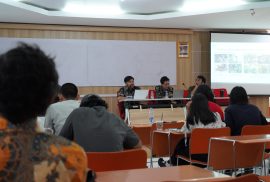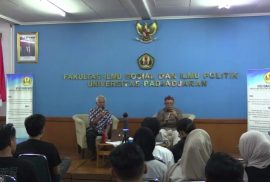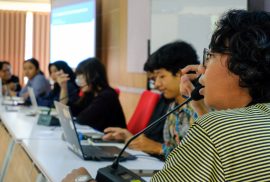The Faculty of Cultural Sciences at Gadjah Mada University (UGM) successfully held the “Conference on Locality, Ontology, and Environmental History” on June 25-26, 2025, at the Multimedia Room, Margono Building, UGM. This event served as an interdisciplinary academic discussion platform aimed at re-evaluating how locality and traditional knowledge can contribute to global environmental issues, aligning with the Sustainable Development Goals (SDGs) such as education for sustainability, air quality, climate change, and ecosystem preservation.
The conference was inaugurated by Dr. Mimi Savitri, the Vice Dean for Research, Community Service, and Cooperation at the Faculty of Cultural Sciences. In her opening remarks, she emphasized the importance of collaboration between academics and communities in re-examining the relationship between humans and nature from local and ontological perspectives. This collaboration is crucial for addressing pressing environmental challenges and fostering sustainable practices.
The event also featured welcoming speeches from Farabi Fakih of the UGM History Department and Prof. Diana Suhardiman from KITLV, who highlighted the significance of integrating local wisdom into contemporary environmental discourse. Their insights underscored the need for a holistic approach to understanding the intricate connections between culture, history, and the environment.
The conference included six thematic discussion panels, covering a wide range of issues from climate change, water and land management, power and environment, local knowledge, urban social movements, to historical reflections on the Cretaceous period and the Anthropocene. These discussions aimed to bridge the gap between scientific research and local practices, fostering a deeper understanding of environmental sustainability.
For instance, the first panel showcased studies on climate adaptation based on the spiritual-ecological practices of farmers in Playen, Gunungkidul, as well as the management of the Wonosadi Customary Forest. These case studies illustrated how traditional practices can inform modern environmental strategies, contributing to the SDGs related to climate action and ecosystem preservation.
Meanwhile, the fifth panel addressed the issue of urban segregation in Yogyakarta, which has shifted from racial divides to competition for access to water resources. This discussion highlighted the critical need for equitable resource management in urban settings, emphasizing the role of local communities in advocating for their rights and environmental justice.
Overall, the conference served as a significant platform that brought together science, activism, and local wisdom, embodying the spirit of decolonizing knowledge in addressing the global environmental crisis. By fostering dialogue among diverse stakeholders, the event aimed to inspire innovative solutions that prioritize sustainability and the well-being of both people and the planet.
The success of this conference reflects UGM’s commitment to advancing education for sustainability and promoting interdisciplinary collaboration in tackling climate change and enhancing air quality. As the world faces increasing environmental challenges, initiatives like this are essential for cultivating a more sustainable future.
[Public Relations of FIB UGM, Candra Solihin]




